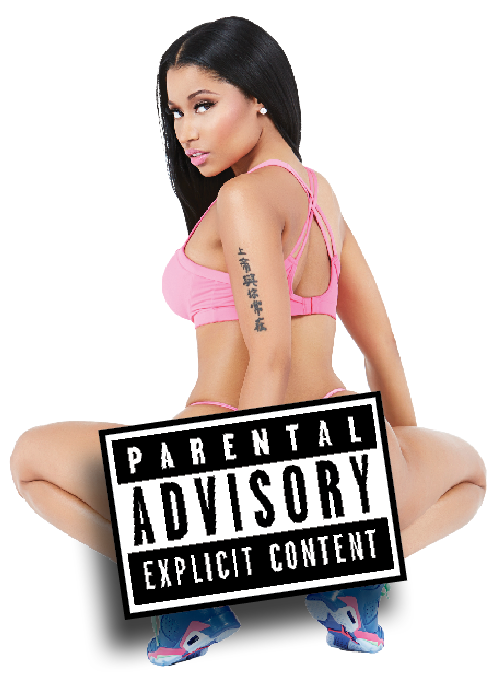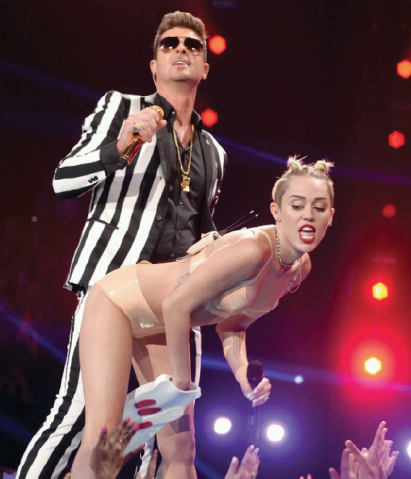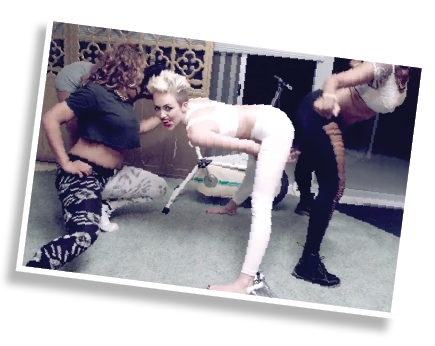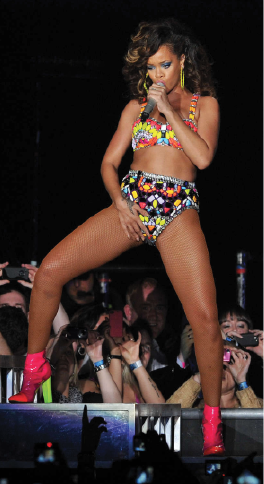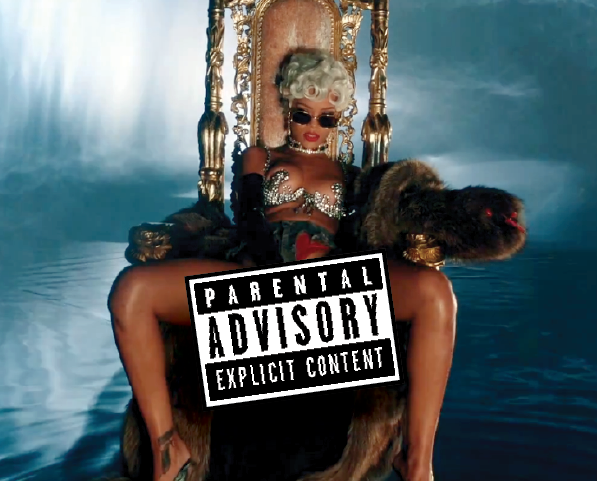Wiggling bums and raunchy pop are here to stay. But at what cost? Chloe Mason examines how an industry obsessed with sex is creating a warped view of women and dragging children along for the ride
| N a digital age where children receive their own tablet computers at the age of five (and often younger), it’s no wonder many parents are worried. These kids are exposed to about everything the internet has to offer (literally everything, if the right filters aren’t set up), and monitoring what they’re watching or listening to is never as simple as it should be. Online porn and inappropriate chat rooms raise the biggest concerns, of course, but recent studies suggest that, while important, they’re not the only web-based worry for parents – pop music and music videos should be monitored too. Turn on a popular radio station any day of the week and explicit songs delving into sex, alcohol and drugs are de rigueur. Watch the corresponding videos, and many will border on softcore porn. |
In the past year alone there have been many heated debates about the shockingly provocative music videos of popular entertainers like Miley Cyrus and Nicki Minaj, who have pushed the boundaries of the music industry so far that it’s actually now more shocking to see them turn up to work dressed in a full suit, rather than the teenie-weenie bits of cloth they normally string around their privates before a twerk out.
Problem is, these hyper-sexualised artists hell bent on waving their gelatinous bottoms for all to see are the trendsetters of their generation. And when teens, or younger children, see this as being acceptable behaviour, who’s to say they won’t follow suit?
There is no doubt that media powerfully influences our identity and self-definition – we tend to seek out role models and borrow characteristics from them – and adolescents are most likely to imitate their favourite actors, artists, football players or superheroes.
Problem is, these hyper-sexualised artists hell bent on waving their gelatinous bottoms for all to see are the trendsetters of their generation. And when teens, or younger children, see this as being acceptable behaviour, who’s to say they won’t follow suit?
There is no doubt that media powerfully influences our identity and self-definition – we tend to seek out role models and borrow characteristics from them – and adolescents are most likely to imitate their favourite actors, artists, football players or superheroes.
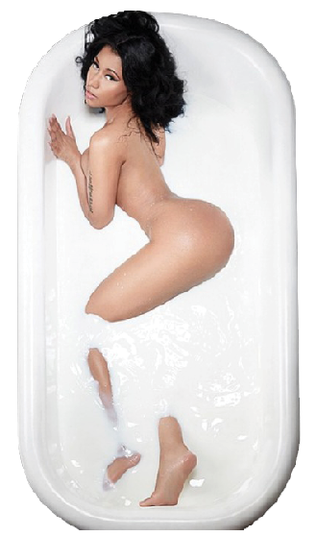 Nicki Minaj hit headlines last month with the release of Anaconda, whose accompanying video featured the bare-bottomed artist smearing whipped cream all over her chest.
Nicki Minaj hit headlines last month with the release of Anaconda, whose accompanying video featured the bare-bottomed artist smearing whipped cream all over her chest. I was certainly guilty of it.
When I was 12 (I’m now 18), after I had bought Avril Lavigne’s Hot album, I made a conscious effort to be just like my pop punk hero: I wore pink-and-black striped knee socks to school, put on heavy black eye make-up, and constantly had her songs blasting out of my earphones.
It’s scary that media can influence the way we dress and behave, especially at a young age. Take the two sisters Sophia Grace and Rosie, for instance, who, in 2011, appeared on the Ellen DeGeneres show and sang Super Bass, by one of their favourite idols, Nicki Minaj.
Aged just 8 and 5 respectively, the two sisters proudly sang lyrics that went something like this: “He pop bottles and he got the right kind of build/He cold, he dope, he might sell coke…”
Drugs, alcohol and a hint of sex in two sentences. Just what young kids need to be singing, right?
Imagine how Sophia Grace and Rosie, who met Nicki Minaj at the end of the show with screams of joy, would react if they saw their idol’s latest raunchy music video, Anaconda, which sees the rapper shamelessly shake her plump bum with a troupe of scantily clad back-up dancers, and then spread whipped cream all over her chest.
With images like this, it’s no surprise the video has caused huge controversy around the world. But it’s not just Minaj under fire. J-Lo and Iggy Azalea recently raised eyebrows with their raunchy video for Booty; Rihanna’s video for Pour It Up was dubbed by one UK critic as “relentless crotch-level bombardment,” and Miley Cyrus’s We Can’t Stop further boosted the singer’s provocative image thanks to several bum wiggling scenes.
Scottish singer Annie Lennox succinctly summed up the feelings of many when she recently accused modern music labels of “peddling highly-styled pornography with musical accompaniment.”
And who can disagree? As the aforementioned videos have revealed, today’s music industry is obsessed with skin and scandal and presenting women as sex objects – all over the top of a catchy tune.
Clearly, adult entertainment like this is not suitable for kids like Sophia Grace and Rosie. Yet, they still admire Nicki Minaj and claim she is one of their biggest influences in music. Will these girls grow up to be sexualised like her?
It is argued that the hyper-sexualisation of women in the music industry is destroying the innocence of young teens, especially when teamed with the internet’s accessible sexual content. What’s more, the objectification of women in music videos is teaching girls that women are valued for their looks instead of their personalities.
American psychologist and author Mary Pipher said, “Girls today are coming of age in a more dangerous, sexualised and media-saturated culture. They face incredible pressures to be beautiful and sophisticated, which in junior high means using chemicals and being sexual.”
This could explain why so many teenage girls are pressured into sending nude pictures to their boyfriends, and have profile photos on Facebook or Instagram that show too much cleavage. These girls, constantly seeking approval on social media, are becoming increasingly obsessive about their appearance – if they see their favourite stars do it, then they think it’s acceptable for them to do so too.
When I was 12 (I’m now 18), after I had bought Avril Lavigne’s Hot album, I made a conscious effort to be just like my pop punk hero: I wore pink-and-black striped knee socks to school, put on heavy black eye make-up, and constantly had her songs blasting out of my earphones.
It’s scary that media can influence the way we dress and behave, especially at a young age. Take the two sisters Sophia Grace and Rosie, for instance, who, in 2011, appeared on the Ellen DeGeneres show and sang Super Bass, by one of their favourite idols, Nicki Minaj.
Aged just 8 and 5 respectively, the two sisters proudly sang lyrics that went something like this: “He pop bottles and he got the right kind of build/He cold, he dope, he might sell coke…”
Drugs, alcohol and a hint of sex in two sentences. Just what young kids need to be singing, right?
Imagine how Sophia Grace and Rosie, who met Nicki Minaj at the end of the show with screams of joy, would react if they saw their idol’s latest raunchy music video, Anaconda, which sees the rapper shamelessly shake her plump bum with a troupe of scantily clad back-up dancers, and then spread whipped cream all over her chest.
With images like this, it’s no surprise the video has caused huge controversy around the world. But it’s not just Minaj under fire. J-Lo and Iggy Azalea recently raised eyebrows with their raunchy video for Booty; Rihanna’s video for Pour It Up was dubbed by one UK critic as “relentless crotch-level bombardment,” and Miley Cyrus’s We Can’t Stop further boosted the singer’s provocative image thanks to several bum wiggling scenes.
Scottish singer Annie Lennox succinctly summed up the feelings of many when she recently accused modern music labels of “peddling highly-styled pornography with musical accompaniment.”
And who can disagree? As the aforementioned videos have revealed, today’s music industry is obsessed with skin and scandal and presenting women as sex objects – all over the top of a catchy tune.
Clearly, adult entertainment like this is not suitable for kids like Sophia Grace and Rosie. Yet, they still admire Nicki Minaj and claim she is one of their biggest influences in music. Will these girls grow up to be sexualised like her?
It is argued that the hyper-sexualisation of women in the music industry is destroying the innocence of young teens, especially when teamed with the internet’s accessible sexual content. What’s more, the objectification of women in music videos is teaching girls that women are valued for their looks instead of their personalities.
American psychologist and author Mary Pipher said, “Girls today are coming of age in a more dangerous, sexualised and media-saturated culture. They face incredible pressures to be beautiful and sophisticated, which in junior high means using chemicals and being sexual.”
This could explain why so many teenage girls are pressured into sending nude pictures to their boyfriends, and have profile photos on Facebook or Instagram that show too much cleavage. These girls, constantly seeking approval on social media, are becoming increasingly obsessive about their appearance – if they see their favourite stars do it, then they think it’s acceptable for them to do so too.
| As for boys. Well, when females are presented as nothing but objects with which to copulate, it’s no surprise they begin to develop degrading and unrealistic expectations about women. We shouldn’t blame just the music industry of course for sexualising women, but also other aspects of popular media such as advertisements, commercials, billboards, TV shows and magazine covers. There is no doubt that sex sells and catches people’s attention, but are the detrimental effects that sexualised images have on young teens worth it? After all, when a girl fails to meet the expectations of the media’s standards of beauty, this can lead to low self-esteem, eating disorders and depression. And as for being constantly bombarded with images of sex – well, one study, conducted over four years, found that teens who watched shows that displayed frequent sexual content were more likely to engage in sexual activity and become pregnant. I decided to find out what my peers thought about the sexualisation of women in pop culture, and conducted a survey via Facebook. The resulting debate was almost as hot as a Nicki Minaj video. Many people thought along these lines: |
“Artists have the choice to affiliate any image or dance with their song, if that’s how they view the clip to be.”
“They could dance around naked, and it is not their fault nor their responsibility whether little boys develop a sexual image or not of women.”
But many others were completely against it:
“What goes through the minds of people who puts these things together? Do they forget that one of the principles of caring for children is protecting their innocence?”
“Young people are susceptible to media influence and to peer pressure… Girls are then judged by men and women in their sexuality rather than on other traits of that person.”
“I don’t like how singers feel the need to expose so much of themselves to the public just to bring out the message of their songs. It is becoming vulgar as well as sexualized. It’s basically like pornography that we see on YouTube.”
“In the 90s you still see all these music videos with girls hyper-sexualised but now we are recognizing it more. Media has always been pretty intrusive.”
“They could dance around naked, and it is not their fault nor their responsibility whether little boys develop a sexual image or not of women.”
But many others were completely against it:
“What goes through the minds of people who puts these things together? Do they forget that one of the principles of caring for children is protecting their innocence?”
“Young people are susceptible to media influence and to peer pressure… Girls are then judged by men and women in their sexuality rather than on other traits of that person.”
“I don’t like how singers feel the need to expose so much of themselves to the public just to bring out the message of their songs. It is becoming vulgar as well as sexualized. It’s basically like pornography that we see on YouTube.”
“In the 90s you still see all these music videos with girls hyper-sexualised but now we are recognizing it more. Media has always been pretty intrusive.”
| Of course, sexualisation in pop culture is nothing new; artists have always sold sex. From lead singer Cherie Currie of The Runaways, who paraded on stage in a pink corset in 1977, singing “I’ll give ya something to live for/ Have ya, grab ya till you’re sore,” to Christina Aguilera’s 2002 single Dirrty – “I need that, uh, to get me off/Sweatin’ until my clothes come off” (and whose video featured the pop princess gyrating in crotchless pants, thong and bra), pop performers have always had a penchant for the erotic. It’s the same with Hip-hop and R&B. Influenced by the call-and-response traditions of early blues music, whose lyrics often involved enchanting sexual encounters, rappers from the ’80s onwards are all guilty of spitting rhymes steeped in sex, often without innuendo – who could forget the lyrics from Sir Mix-a-Lot’s 1992 ode to big bottoms, Baby Got Back: “I want ‘em real thick and juicy”, or Robin Thicke and Pharrell’s catchy-but-scary 2013 hit, Blurred Lines – “Nothin’ like your last guy, he too square for you / He don’t smack that ass and pull your hair for you.” |
| It’s only in recent years, however, that female rappers have adopted the same misogynistic attitudes pandered by the male rappers, the belief being that by shaking their own booties, and singing about their own bodies, these female artists are ultimately expressing an empowerment of female sexuality. oes this mean we should condone Nicki Minaj and other similar artists, their racy music videos, their vulgar lyrics? In an interview with ABC news, Nicki Minaj explained her intentions for her video |
Anaconda: “I wanted to reinstate something,” she said. “Because of the shift in pop culture, even hip hop men are really glorifying the less curvy body. I wanted to say hey ladies, you’re beautiful.”
Minaj told ABC that hopefully this would change how people view her video. Ironically, Minaj’s message was overshadowed by the steamy background and crude lyrics, which made viewers see her as a sexualised artist, instead of someone who was attempting to communicate a meaningful message to her audience.
No matter what an artist’s intentions may be, the reaction of their viewers is more important, because ultimately what they observe in pop culture can influence their self-esteem and how they perceive others.
The most important thing here is to teach young teens to be proud of their body and to be confident in themselves without subscribing to the media’s idea of beauty. It’s crucial that women don’t become entangled in sexualising themselves, because appearance is only skin deep, and, after all, true beauty is whatever you define it to be.
What do you think? Let us know at www.thebigchilli.com
Minaj told ABC that hopefully this would change how people view her video. Ironically, Minaj’s message was overshadowed by the steamy background and crude lyrics, which made viewers see her as a sexualised artist, instead of someone who was attempting to communicate a meaningful message to her audience.
No matter what an artist’s intentions may be, the reaction of their viewers is more important, because ultimately what they observe in pop culture can influence their self-esteem and how they perceive others.
The most important thing here is to teach young teens to be proud of their body and to be confident in themselves without subscribing to the media’s idea of beauty. It’s crucial that women don’t become entangled in sexualising themselves, because appearance is only skin deep, and, after all, true beauty is whatever you define it to be.
What do you think? Let us know at www.thebigchilli.com

